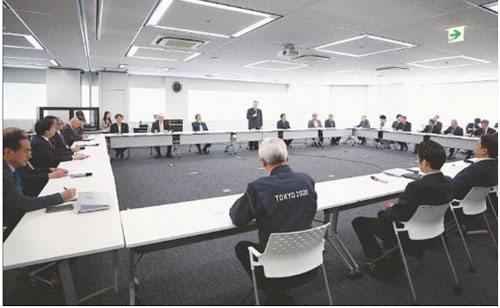TOKYO The Tokyo Olympics need new dates for the opening and closing ceremonies in 2021. Nothing much can get done until those dates are worked out by the International Olympic Committee, the Japanese government and Tokyo organisers. “We must decide this soon, otherwise it will be hard to decide on other things to follow,” Toshiro Muto, the CEO of the organising committee, told his 30 senior directors — all men but one — seated in a large meeting room on Thursday. Two days after the unprecedented postponement was announced, the group gathered for the first meeting of what is being called the ‘Tokyo 2020 New Launch Task Force’. They must put the Olympics back together after they were torn apart by the coronavirus pandemic. Muto and the president of the organising committee, Yoshiro Mori, each gave pep speeches. Mori, an 82-year-old former Japanese prime minister, drew on war memories from his youth to summon the resolve to redo in a few months what was seven years in the planning. He talked of his father going to the war in the Pacific and leaving a rugby ball and a baseball glove behind for his young son. “I’m sorry, I’m an old person and I talk about the old days,” Mori said. “I’m comparing this to the old days and I might be criticised by the media. However, this is the emotion I have inside me and this is the emotion I have as we face the predicament in front of us.” Muto ran off a condensed string of issues to be resolved: ticketing, security, venues, merchandise, accommodation, the Athletes Village, transportation and lining up unpaid volunteers. He added he was looking at thousands of contracts “and the interests of broadcasters, sponsors, the IOC, world sports federations and national Olympic committees”. “I didn’t imagine at all we’d be tested to this degree,” he acknowledged. “We want to make sure we go beyond this test and that next year in Tokyo, the torch is lit for the Olympic and Paralympic Games. We believe this is the mission we face.” “Additional expenses are going to be quite massive we assume,” Muto said. “With regards to our revenues, we need to make a lot of effort there.” Muto gave no estimates for how much the process of postponing the Olympic and Paralympic Games could cost. But according to the Nikkei daily, organisers estimate it will cost an extra $2.7 billion, including for venue rentals, rebooking hotels and additional payments for staff and security guards, among others. Those costs could still come down depending on the outcome of negotiations, the business daily reported. Muto said organisers would not rip up their existing plans, but added: “I guess we need to step back a bit. Sometimes you need to go back to the drawing board.” The Olympics have never faced this much disruption in peacetime, and the decision to delay the event has created unprecedented challenges, Mori said. “Tokyo 2020 staff will experience difficulties they have never experienced before. I am sure they will rise to the occasion. This is going to be a very difficult task that we are facing,” he said. No deadlines have yet been set for the rescheduling of the Games, which are now due to take place by summer 2021, but Mori said he would ensure “all the decisions are made as quickly as possible”. IOC President Thomas Bach said on Wednesday “all options” were on the table for rescheduling, including holding the Games before the Japanese summer. John Coates, the IOC’s Coordination Commission chief for Tokyo, however told the Yomiuri newspaper that the IOC was working with sports bodies to arrange a July-August window for the Olympics and hopes to confirm the schedule within a month. “We want to more or less finalise the dates in four weeks’ time,” the paper quoted Coates as saying. Coates said the summer scheduling would be dependent on avoiding clashes with the world championships for swimming (July 16-Aug. 1) and athletics (Aug. 6-15). World Athletics boss Sebastian Coe has said the world athletics championships in Eugene, Oregon could be moved back to 2022 if necessary. If the Olympics are moved into spring, when it’s cooler in Tokyo, they clash with the end of the European football season. In North America, they would bump into Major League Baseball, NBA basketball, NHL hockey and possibly even college basketball. That’s assuming normal sports schedules resume by then. Hidemasa Nakamura, the games delivery officer, was pressed again on dates. “No specifics have been discussed yet on the timing of the delayed Games, but a date needs to be decided as soon as possible,” he said.—AFP









